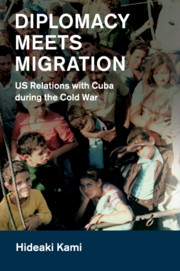'Kami has fashioned a compelling assessment of Cuban immigration as a factor of decisive policy importance, and thereupon to plumb deeply into the complexities of Cuba-US relations between the 1960s and the 1990s. He answers some old questions and, just as important, he has raised new ones.'
Louis A. Pérez
Source: The American Historical Review
'Using an impressive array of multinational sources, Hideaki Kami weaves the compelling tale of how Cuba’s migration became ultra-politicized and how, in turn, it sabotaged US diplomatic relations with the Castro regime. Never again should we discuss US-Cuban relations without due consideration for the Cuban diaspora.'
Alan McPherson - author of Yankee No!
'Diplomacy Meets Migration will find a prominent place on the shelves of scholars of the Cold War, immigration, and American politics. Smartly written and compellingly argued, this book reveals how leaders in Miami, Havana, and Washington, DC managed the complex political and policy issues arising at the intersection of diplomacy and migration. In telling this story, Hideaki Kami recasts our understanding of Cuban-American relations and shows himself as one of the best young historians of migration and America and the World.'
Carl Bon Tempo - author of Americans at the Gate: The United States and Refugees during the Cold War
'Kami's transnational approach to narrating how Cuban migrants actively shaped the US 'national interest' is valuable to scholars of international migration … To interlace previously disparate threads of Washington, Havana, and Miami’s relationships with one another, Kami draws on an impressive range of sources.'
Melissa Hampton
Source: International Migration Review
'Kami's remarkable study reminds us that migration remains a historical constant. Rare is the nation that exists without some portion of its citizens living abroad.'
Jonathan C. Brown
Source: Diplomatic History
'Diplomacy Meets Migration is based on an impressive range of sources, including (recently declassified) US and Cuban government archives, records of Cuban-American lobby groups, and supporting materials from the diplomatic records of Canada, Japan, Mexico and the United Kingdom. The insights that Kami derives from these archives, as well as secondary sources that range from diplomatic histories to sociological studies, add up to an original analysis of US-Cuban relations throughout the Cold War.'
Jorrit van den Berk
Source: Diplomatica
'Analysts disagree about how to explain a state's foreign policies. One group focuses on the effects the power distribution among states has on the actions of a state; a second group emphasizes the role of domestic politics; and a third concentrates on the ideas and beliefs of the state's leaders. Kami's excellent analysis transcends those artificial boundaries … he identifies the multiple external factors that affected the complex interactions between Havana, Washington, and Miami.'
Alex Roberto Hybel
Source: The Americas
‘Beautifully written with proper empathy given toward actors in all three nodes of historical action - Washington, Havana, and Miami - Diplomacy Meets Migration is an enormous contribution to the social and diplomatic history of migration and to the political and parapolitical complexities of a central zone of imperial rupture within Latin America’s Cold War.’
Thomas C. Field Jr
Source: Latin American Research Review
‘This book is what international history is supposed to look like.’
Alexander Poster
Source: H-Diplo
‘Whatever the next years may bring, by combining an analysis of diplomacy and migration, and by taking Miami seriously as a third actor in US-Cuban relations, this book does much to explain how the dynamic came to be.’
Patrick Iber
Source: Cuban Studies



